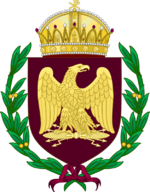Claudian dynasty
| House of Claudius | |
|---|---|
 | |
| Country | |
| Founded | 560 BC 372 (as ruling dynasty) |
| Founder | Emperor Iovanius |
| Current head | Constantine XX |
| Titles | |
| Style(s) | "His/Her Imperial Majesty" "His/Her Imperial Highness" |
| Estate(s) | Palace of Augustus (official seat) Palatium Supranio (historical seat) Palatium Purpura Castra Felicis (private residence) |
| Cadet branches |
|
The House of Claudius is an Belisarian royal house of Latin origin. The modern Claudii trace their ancestry to gens Claudia, which records first show surfaced in the 6nd century BC. The family was an ancient patrician family, entitling it to a seat in the early Senate of Alba and Castellum. The family first rose to prominence in the early Imperial era as Masters of the Aventine, a district of ancient Castellum. Theodosius Claudius Nero Aggrippa was the first member of the dynasty to marry into the Imperial line, resulting in his son Iovanius launching a successful war for the throne in 370. The Claudii first ruled Latium until the Crisis of the 11th Century, resulting in the line's near extinction. The House of Claudius remained in Adrianople ruling as petty rulers, until the 15th century eventually holding the distinction as Duke of Adrianople. The House of Claudius regained the Latin throne in the 1997 with the ascension of Emperor Jason VI Augustus; his son, Constantine XX, is the current Latin Emperor and head of the House of Claudius.
History
The nomen Claudius, originally Clausus, is originally derived from the word claudus, which roughly translates to "lame". Gaius Claudius is the first Claudii attested to be a Senator of Alba in 560 BC, with a branch of Claudii earned membership in the Castellum Senate around 300 BC. The first Claduia is said to be Gaius Claudius, who was believed to be of Ietlian origin. Gaius Claudius rose to prominence as a general in the 2nd Alban-Ietlian War, becoming a Senator of Alba in 560 BC. A branch of the Claudii earned membership in the Castellum Senate around 300 BC.
Members of the family continued to hold key offices of state throughout early periods of Latin history, from the union of Alba and Castellum to the start of the Empire when Appius Claudius Nero was made Master of Ianiculum in 195 BC. In 330, Theodosius Claudius Nero married Maria Agrippa the Younger, sister of Emperor Albanulus. In 368, their son, Iovanius challenged Emperor Albanulus, prompting a civil war which resulted in Iovanius becoming Latin Emperor, and founder of the Claudii dynasty. His descendants ruled Latium until 1052, surviving the chaos and upheaval of the 6th century, and loss of most territory beyond modern day Latium, Sydalon and Fakolana. The Crisis of the 11th Century saw the dynasty overthrown by the House of Ostia, an illegitimate Claudii line.
Peter of Adrianople continued the former imperial line, with his descendants ruling Adrianople and the surrounding area from the 11th to 15th centuries. In 1428, the independent Claudii rulers of Adrianople were reincorporated in Latium, with last ruler Constantine IV of Adrianople made Duke of Adrianople. The dynasty served as a prominent Latin noble family thereafter, often earning the consulship. Dynast Jason Claudius, Duke of Adrianople is the longest-serving consul, holding the office for 15 years from 1946 until 1961. The House of Claudius became the Imperial house of Latium in 1997 with the elevation of Jason VI Augustus to co-Emperor in 1997, reigning alongside his mother Diana Augusta until 2000.